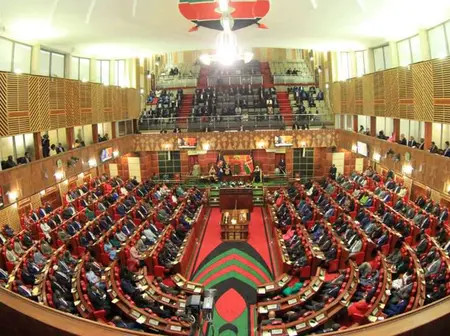MPs are debating a new Bill that seeks to regulate the naming and numbering of streets, houses, and buildings to improve planning and make it easier to deliver services.
The Bill, known as the National Addressing Bill 2025, requires counties and property developers to follow national standards when naming streets and numbering buildings and homes.
The Bill, sponsored by Kiambu MP John Machua, also proposes the creation of a special authority to oversee the process and give Kenyans a safe and convenient system of identifying and locating properties.
MPs are optimistic that the system will improve service delivery and facilitate the growth of e-commerce.
The bill also seeks to put a stop to the confusion and inconsistencies that have for long characterized postal services, slowed down emergency response, made urban planning more challenging, and reduced efficiency in revenue collection.
Under the proposal, the National Addressing Council will take charge of enforcing national standards on street and property addressing. The council will also promote the use of modern technology such as digital mapping and collaborate with counties to ensure the system runs smoothly.
“The enactment of the proposed legislation will ensure seamless naming and numbering of streets and properties, which will lead to improved identification and location of places, which will subsequently improve the country’s economy in terms of trade and revenue generation,” the Bill reads.
The draft law also provides for the creation of the County Addressing Committees. This body will be responsible for designing and managing the system of naming, numbering, and allocating addresses to streets and properties at county levels.
If the Bill is enacted by Parliament, Kenya will, for the first time, have a comprehensive legal framework to guide street naming and house numbering. The legislators believe this will align the country with international best practice, besides increasing efficiency in government service delivery, emergency services, business operations, and revenue collection.
The proposed law outlines the composition of the National Addressing Council, which will oversee the country’s new addressing framework. The council will include a non-executive chairperson appointed by the President, a vice-chairperson nominated by the Council of Governors, and principal secretaries from the ministries of national addressing, finance, and land and physical planning.
Other members will comprise the chairperson of the Kenya Consumer Protection Advisory Committee, two private sector experts nominated by the ICT Cabinet Secretary for their knowledge in ICT, planning, addressing, or legal matters, and a registrar who will serve as the council’s secretary.
Members, including the chairperson, will serve a renewable three-year term. At the county level, governments will establish committees that will be tasked with creating registries of all named streets and numbered properties within their jurisdictions. The information will then be channeled into a national database to ensure accuracy and consistency across the country.
Property owners will be required to display their assigned numbers clearly on their properties.. Kiambu MP John Machua, who sponsored the Bill, argues that the measure will remove long-standing inefficiencies in public service delivery, especially in law enforcement, ambulance response, parcel delivery, and utility billing.
“The enactment of the proposed legislation will ensure seamless naming and numbering of streets and properties, which will lead to improved identification and location of places which will subsequently improve the country’s economy in terms of trade and revenue generation, particularly through e-commerce and enhanced tax collection,” Machua stated.
The Bill also prescribes penalties for non-compliance. Developers or homeowners who fail to follow numbering regulations will face fines, while anyone caught vandalizing infrastructure developed under the law will risk a penalty of up to Ksh1 million.

Leave a Reply